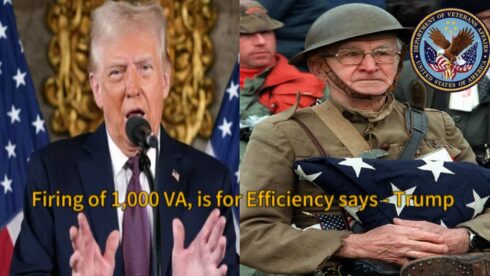U.S President Donald Trump says “This is about efficiency, about making the Veteran Affairs (VA ) work better,” he declared, defending his decision to fire over 1,000 employees from the Department of Veterans Affairs. However, veterans’ groups and lawmakers from both sides of the aisle see it differently, calling it a direct attack on those who have served the nation.
The mass layoffs primarily affect probationary employees, many of whom were actively involved in research, mental health services, and benefits administration. While Donald Trump’s allies claim these cuts will streamline operations, opponents argue that they will cripple an already overwhelmed VA system, leading to longer wait times, reduced care quality, and increased frustration among veterans.
Donald Trump’s $98 Million “Cost-Cutting” Strategy Sparks Skepticism
“We’re saving a lot of money, and it’s going right back into veterans’ benefits,” Donald Trump insisted, emphasizing that the cuts would free up $98 million. Yet, critics aren’t buying it. Many suspect that these savings will instead be funneled into corporate tax cuts or other political initiatives, rather than improving VA services.
For years, the VA has struggled with underfunding and staffing shortages, making it difficult to meet the needs of the nation’s veterans. Slashing over a thousand jobs only exacerbates these problems, critics argue, raising questions about whether this move is about efficiency—or about pushing veterans toward privatized healthcare options.
Bipartisan Condemnation: Lawmakers Fight Back
“This is a disgrace,” said Senator Chris Van Hollen, responding to the layoffs. “Donald Trump does not believe in service, does not believe in sacrifice.” His statement reflects growing bipartisan frustration over what many see as a politically motivated decision.
Senator Patty Murray, a vocal advocate for veterans’ healthcare, warned that these cuts would derail critical research on PTSD, cancer treatments, and opioid addiction recovery. “Researchers in my state are being told to pack their bags—not because their work isn’t needed, but because Donald Trump and Musk want to gut the VA,” she said, referring to Elon Musk’s increasing influence in federal agencies.
Veterans’ Groups Sound the Alarm Over Service Disruptions
“This is going to hurt veterans—plain and simple,” said a spokesperson for the American Legion, one of the nation’s largest veterans’ organizations. Groups like the Legion and the VFW warn that these cuts will create immediate backlogs in medical care, disability claims processing, and mental health services.
For many veterans, navigating the VA system is already challenging. With fewer personnel to assist them, the risk of delays and errors in benefit approvals could skyrocket. Some advocates fear that this is a deliberate move to weaken public confidence in the VA, making privatization seem like the only solution.
The Elon Musk Factor: Is the VA Being Set Up for Privatization?
“We’re looking at all options to make the VA work better,” Donald Trump has said in the past, hinting at a push toward privatizing veterans’ healthcare. With Elon Musk’s growing influence in federal agencies, some fear that the billionaire’s corporate mindset is steering the VA away from public service and toward a profit-driven model.
If the VA is weakened, private contractors could step in, offering veterans care at a higher cost while reducing oversight and accountability. This shift would align with Donald Trump’s broader agenda of deregulation and privatization, but at the expense of veterans who rely on specialized, government-supported care.
What’s Next? Veterans Caught in the Political Crossfire
“Nobody has done more for veterans than me,” Trump has often claimed. Yet, his actions tell a different story. With the VA now facing potential service disruptions, veterans and their families are left wondering if their benefits and healthcare will suffer as a result of these firings.
Democratic lawmakers are pushing for emergency measures to halt the layoffs, but the political battle is just beginning. As Donald Trump eyes another run for office, his handling of veterans’ issues may become a major campaign flashpoint. The real question is whether America’s veterans will be better off—or left behind—under his leadership.














